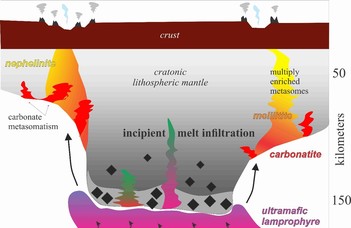The composition of melts in the incipient melt regime in upper mantle

07. December 2020. 11:00 - 12:00
online
07. December 2020.11:00 - 12:00
online
The composition of mantle-derived magmas suggests a remarkable variety in the abundances of volatiles of the upper mantle. Volatile components, like H- and C-species (H2O, CO2, CH4, H2), generally depress the melting point of mantle considerably. However, we have little knowledge about these first, incipient melts. The incipient melts exist in a large temperature range (~300°C) in the upper mantle, but the chemical compositions of these melts are poorly constrained, and therefore the effect of volatiles on the various melt proportions could change the behaviour of melt significantly.
Nature provides us with limited samples of primitive mantle-derived melts, which have mostly suffered fractionation or weathering processes. These incipient melts have importance due to the potential to transport large amounts of volatiles and alkalis through the upper mantle and metasomatize the surrounding rocks. In most cases, these metasomatic reactions are complete, where the metasomatic agent can only be inferred, but not observed directly. Therefore, its crucial to characterize the incipient melts with various volatile contents and with various peridotitic compositions to understand the low degree metasomatic melts and its effect on metasomatism and refertilization processes of the upper mantle.
It´s necessary to simplify the picture for studying the primitive melts. Experimental petrology provides better insights into the incipient melting regime in mantle conditions. This seminar aims to fill this knowledge gap by determining the compositions of incipient melts under the influence of various mixtures of the volatile components H2O and CO2, following the oxidized solidus of peridotite. This experimental research (using piston cylinder and multi anvil apparatuses) consist of a systematic study to determine the chemistry of incipient melts using different peridotitic upper mantle rock compositions (from enriched towards depleted peridotites).
In this seminar, Zsanett Pintér will cover an introduction about experimental petrology and its challenges; melting in upper mantle and the effects of volatiles (H2O, CO2) on melting. Furthermore, she will highlight some case studies where these silica-poor, volatile-rich melts play key roles in refertilization and diamond formation processes.
Zsanett joined the Lithosphere Fluid Research Lab as a bachelor student in 2008 and began her scientific research on upper mantle derived xenoliths under the mentorship of Csaba Szabó and István J. Kovács. Zsanett graduated in 2013 with a B.Sc. degree in earth at the Eötvös Loránd University. She studied experimental geosciences as her M.Sc. degree at the Bavarian Research Institute of Experimental Geochemistry and Geophysics, University of Bayreuth, Germany. Later, she moved to Macquarie University (Sydney, Australia) where she was awarded with Ph.D. in 2020. Now, she is a research fellow and piston-cylinder lab manager at Monash University (Melbourne, Australia).
Since the formation of the Lithosphere Fluid Research Laboratory (LRG) in 1998, the group led by Csaba Szabó published more than 100 peer-reviewed scientific publications, and more than 50 TDK and OTDK winning student theses. In their scientific work, the students of the LRG cover broad areas of geochemistry of the lithosphere and its fluids, such as fluid and melt inclusions in various geological environments, petrology of the lower crust and the upper mantle, geological storage of CO2, the source and fate of radon, or environmental and urban geochemistry of former industrial centers. The LRG initiated this seminar series in 2019, in order to invite former student of the laboratory (who are now accomplished scientists) to present their research to the next generation of geochemists.
